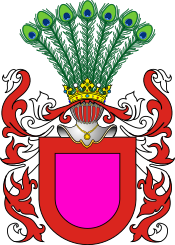House of Sobieski
The House of Sobieski (plural: Sobiescy, feminine form: Sobieska) was a prominent magnate family of Polish nobility in the 16th and 17th centuries. The family used the Janina coat of arms.
According to the family's legend, disproved by modern historians, it traced its lineage to a Polish duke, Leszek II the Black. Another family legend said that they were the descendants of Duke Sobiesław, the son of Leszko III, a legendary ruler of the Popielids dynasty. The family reached the height of its power and importance in the late 16th and 17th centuries, when one of its members was elected King of Poland: John III Sobieski (Jan III Sobieski). The last male member of the branch of the family that began with John's grandfather, Marek Sobieski, in the 16th century was Jakub Ludwik Sobieski (1667–1737).
The Sobieski family used the Janina coat of arms, and their motto was Vel cum hoc, vel super hoc.
Coat of Arms of John III Sobieski as the King of Poland
Portrayal of Sobieski's royal crown, Gdańsk.
St. Lawrence's Church in Żółkiew. Mausoleum of the Żółkiewski and Sobieski family
Wilanów Palace, Warsaw
Wilanów Palace, Warsaw
Among the descendants of John III Sobieski were one Holy Roman Emperor (simultaneously one King of Bohemia and one King of Germany), seven Kings of Saxony (simultaneously one Duke of Warsaw), one King of Bavaria, two Kings of Italy (simultaneously one Emperor of Ethiopia and one King of the Albanians), one Tsar of Bulgaria, one Emperor of Austria (simultaneously one King of Hungary), one Queen consort of Spain and one titular Queen consort of England, Ireland and Scotland.
...
Wikipedia

